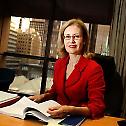Hon. Ms Gabrielle Upton On National Day of Serbia in Parliament of NSW
Ms GABRIELLE UPTON (Vaucluse—Parliamentary Secretary) [6.36 p.m.]: I wish to inform the House that yesterday, 15 February 2012, was celebrated as the National Day of Serbia, and I ask the House to join with me to send our best wishes to the Serbian community of New South Wales. There are around 35,000 people in the New South Wales community who lay claim to Serbian ancestry, according to the last census undertaken in 2006, and 7,000 of these people were born in Serbia. Serbian national day gives an opportunity for those in the New South Wales community with Serbian background to celebrate significant milestones in the history of Serbia.
The day commemorates two significant moments in the history of Serbia. The first commemorates the commencement of the Serbian people's fight for independence on 16 February 1804, more than 208 years ago. It was the day when the Serbian people in a village named Orasac started the first of the Serbian uprisings against the ruling Ottoman Empire, which had suppressed the Serbian people following the Ottoman's success in the Austro-Turkish war between 1787 and 1791. The uprising lasted until 1813 and the end of the Russo-Turkish War of 1806 to 1812. After this war, the Ottoman Empire was able to shift resources to Serbia and overcame the Serbian people. However, the Serbs undertook a second uprising, starting in 1815, when Serbian leader Milos Obrenovic declared war on the Ottoman Empire. This second uprising was a successful campaign, which came to an end in 1817 when a treaty was signed with the Ottomans and the principality of Serbia was declared.
The second event commemorated on Serbian national day is the signing of the first constitution for the principality of Serbia, which occurred on 15 February 1835. The signing of the constitution was when Serbia transformed from an Ottoman province to an independent parliamentary principality. Serbia was only the second nation that abolished feudalism after France, and the constitution also paved the way for parliamentary democracy to be introduced. These were still radical ideas in Europe at the time that that occurred.
Serbia was not formally recognised as an independent democracy until the Treaty of Berlin in 1878. However, the country has operated informally as an independent State since the constitution was signed, and continued to fight for formal recognition of independence until 1878. This is why the National Day of Serbia commemorates both these events—the first Serbian uprising and the signing of its constitution. It was these events that bookended the struggle that Serbia undertook in order to find independence and freedom. Since 1985 the Serbian nation has developed into a nation of more than seven million people, with an $86 billion economy. Like Australia, indeed like New South Wales, the services sector accounts for the largest portion of its workforce, with approximately 50 per cent of workers employed in that sector. But Serbia, as we know, has continued to face struggles.
Tensions between the Serbs, the Croats and the Bosnians, which previously resulted in the war in the former Yugoslavia between 1991 and 1999, still exist. Australia, and indeed New South Wales, was willing to help and instituted a humanitarian immigration program for refugees who were impacted by the war. From 1992 to 1995 more than 23,000 Serbian refugees settled in Australia by way of the program. In New South Wales 33,000 Serbian refugees were settled, with 74 per cent of them born in Bosnia or Croatia. Those Serbs who settled in Australia during this period joined thousands who had made their way to Australia following World War II. Indeed, my parents-in-law were amongst the latter, escaping in the 1950s from the oppressive Tito regime to build their lives happily and safely in New South Wales.
The Serbian population has contributed to the development of New South Wales whilst maintaining its traditional links to Europe. In New South Wales, for instance, the Serbian community has two newspapers and Serbian radio programs on SBS. The community has become well established, respected and integrated. Indeed, my father-in-law was a beneficiary of the welcoming arms that New South Wales extended to immigrants. He received a scholarship to study architecture at the University of Sydney, after which he established a successful architectural practice that supported his family. The Parliament and the community are proud to share this important day and celebrate those who travelled from all around the world to make Australia their home. On behalf of the New South Wales Government, the Minister and the Premier, I extend to the Serbian community in New South Wales a successful future, as we join with its members to celebrate their independence and freedom.
Private members' statements concluded.
The House adjourned, pursuant to standing and sessional orders, at 6.40 p.m. until Tuesday 21 February 2012 at 12 noon.
Source: www.soc.org.au


